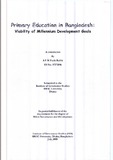| dc.contributor.advisor | Haq, Dr. M. Emdadul | |
| dc.contributor.author | Rabbi, A F M Fazle | |
| dc.date.accessioned | 2010-10-20T09:41:01Z | |
| dc.date.available | 2010-10-20T09:41:01Z | |
| dc.date.copyright | 2008 | |
| dc.date.issued | 2008-07 | |
| dc.identifier.other | ID 07272016 | |
| dc.identifier.uri | http://hdl.handle.net/10361/595 | |
| dc.description | This thesis is submitted in partial fulfillment of the requirements for the degree of Masters of Arts in Governance and Development, 2008. | |
| dc.description | Cataloged from PDF version of thesis. | |
| dc.description | Includes bibliographical references (page 89 - 95). | |
| dc.description.abstract | The progress of the Bangladeshi nation today is more dependent upon the quantity and quality of primary education received by its offspring. Primary education is regarded as the fountain of nation building, national ethos and culture. It has a significant role in the supply of intelligent citizenry needed for ensuring development of the country, and to place a sound base for secondary and higher education. Despite the importance of primary education, experience suggests that, there has been a lack of concrete policy at the primary level from time immemorial. Of late, however, in pursuance of constitutional obligations and commitments made in the international forum, Bangladesh government has expressed commitment to ensure basic `education for all' within the shortest possible time. In 2000, Bangladesh became a signatory country of UN Millennium Development Goals (1`1DGs) and promised to remain faithful to achieving universal primary education by 2015.
The country has specific target of ensuring `equal access' to every child for a full course of primary schooling. However, many factors and actors are both contributing and hindering in achieving the ultimate goal of primary education. Development of primary education poses a daunting challenge because of accessibility and resource constraint. Being supported and assisted by a consortium of development partners, Bangladesh government is implementing second Primary Education Development Program (PEDP-11). In view of the situation the present study investigates how close is Bangladesh to achieve the universal primary education goals by 2015? What measures would he required to achieve them= Using data from the field level and secondary sources this research examines the possibility of achieving non-discriminatory quality education at primary level in the country. | en_US |
| dc.description.statementofresponsibility | A F M Fazle Rabbi | |
| dc.format.extent | 101 pages | |
| dc.language.iso | en | en_US |
| dc.publisher | BRAC University | en_US |
| dc.rights | BRAC University thesis reports are protected by copyright. They may be viewed from this source for any purpose, but reproduction or distribution in any format is prohibited without written permission. | |
| dc.subject | Governance and development | |
| dc.title | Primary education in Bangladesh: viability of millennium development goals | en_US |
| dc.type | Thesis | en_US |
| dc.contributor.department | Institute of Governance Studies, BRAC University | |
| dc.description.degree | M. Governance and Development | |

